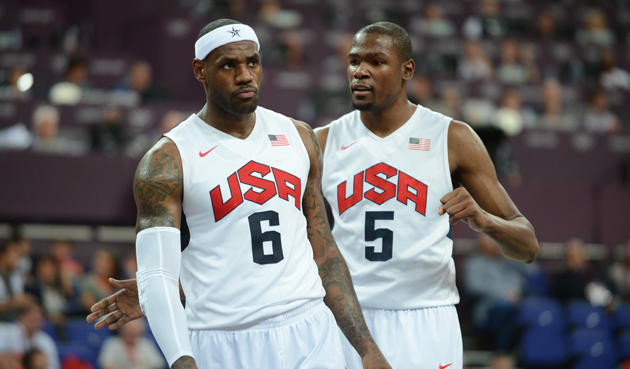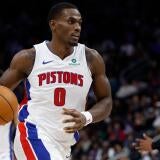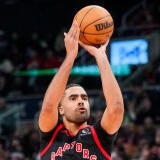FIBA chief: 'It's too early' for Olympics basketball to add age limit
Patrick Baumann of FIBA says that the Olympics do not plan to add an under-23 age limit that would restrict NBA players from participating.
 |
| Kevin Durant would have dominated the 2012 Olympics if it had an age limit, even without LeBron James. (Getty Images) |
The head of FIBA is on the record: He has no plans to ruin basketball in the Olympics.
FIBA secretary general Patrick Baumann said in an interview this week that it would be "too early" to institute an under-23 age limit for basketball in the Olympics for the 2016 summer games in Rio de Janeiro, Brazil.
The age limit plan, floated by NBA commissioner David Stern and others, would coincide with a strengthening of the World Cup, which would proceed without an age limit.
Baumann argued in an interview posted on FIBA.com that the World Cup isn't yet ready for center stage and said that an age limit would create an even bigger gap between the United States and everybody else when it comes to the Olympics.
From a global perspective, the progress of the talent in all other countries doesn't go at the same speed or the same pace as the USA. They don't all have a school system like the USA. So the ability for the rest of the world to produce a lot of talent is not the same as the USA. As a result of that, lowering the age to U23 at the Olympics could actually widen the divide between the USA and the rest of the world.
There is also a more general issue of what the Olympic Games represent. The NBA, the IOC and FIBA, we have all earned a lot - not just in financial terms - from professional athletes being at the Olympics since 1992. This is the case with regards to the way basketball has grown, from where we were then to where we are now.
So it would be premature to make changes in the quality of basketball at the Olympics, especially before having maximised the potential of the World Cup. So it's too early to make any changes in the Olympic programme.
Baumann's comments seem to confirm a report from earlier this month that all ages would be allowed to play during the 2016 Olympics in Rio. In other words, a USA team could feature the likes of LeBron James, Kevin Durant, Chris Paul, Deron Williams, Russell Westbrook, Kevin Love and company rather than field a team of youngsters who are currently in high school or college.
The point made by Baumann about the USA's advantage at the lower age levels is an interesting one. Let's imagine for a moment than a 23-and-under age limit had been in effect for the 2012 London Olympics.
The United States would have been forced to compete with Kobe Bryant, Carmelo Anthony, Tyson Chandler, Andre Iguodala, James, Paul and Williams. However, 2012 team members Durant, Love, Westbrook, Anthony Davis and James Harden all would still have been available. Eric Gordon, one of Team USA's final cuts, could have been added back into the mix and a handful of the following members of the USA's Select Team could have filled out a strong roster: Kyrie Irving, John Wall, DeMarcus Cousins, Derrick Favors, Kawhi Leonard, Klay Thompson, Paul George and Gordon Hayward.
Sure, that team is significantly worse than the squad that wound up winning gold in London? But how would it stack up to the rest of the world?
Let's start with Spain, the silver medalists. The Spanish only had two players who would have qualified for 23-and-under: Serge Ibaka and Victor Claver. Ibaka, one of the NBA's most talented defenders, was a reserve for Spain, playing limited minutes behind Pau and Marc Gasol. Claver was a bench-warmer. Ricky Rubio, had he been healthy, could have competed in a 23-and-under tournament but all of Spain's starting five in London -- the Gasols, Juan Carlos Navarro, Rudy Fernandez and Jose Calderon -- would have been ineligible. Same thing with most of their key reserves: Sergio Rodriguez, Sergio Llull, Felipe Reyes, Fernando San Emeterio and Victor Sada.
The bronze medalists, Russia, would have had it bad too. The Russians wouldn't have had a single player with NBA experience on a 23-and-under roster. Alexey Shved, signed this summer by the Minnesota Timberwolves, would have been their headliner. Reserves Semyon Antonov, Sergey Karasev and Dmitri Khvostov would have been eligible too. The rest of their key performers -- Andrei Kirilenko, Viktor Khryapa, Timofey Mozgov, Vitaly Fridzon -- would all have been ineligible.
Argentina, who finished fourth, would have had it worse than both Spain and Russia. Only one member of their 2012 team was 23-or-under. That was Facundo Campazzo, who only made headlines in London for delivering a low-blow to Carmelo Anthony. All of Argentina's starpower -- Manu Ginobili, Luis Scola, Carlos Delfino, and Andres Nocioni -- would have been left at home.
France, eliminated by Spain in the quarterfinals but considered one of the world's developing powers, would have been without Tony Parker and Boris Diaw, their two top performers in London. Even Nando de Colo, yet to play in the NBA for the San Antonio Spurs, would have been ineligible, along with most of the rest of France's rotation: Ronny Turiaf, Mickael Gelabele, Ali Traore and Florent Pietrus. Joakim Noah, who missed London because of the Olympics, wouldn't have been eligible in a 23-and-under tournament either. The French would have been left with two roster members, although both have NBA experience: Nicolas Batum and Kevin Seraphin.
OK, that's all of the teams that had a legit shot at medalling this time around. What's the takeaway here? A 23-and-under team captained by Durant would have blown all of those teams out by 20+ points with ease. While the USA squad would be downgraded from an "A+" to a "B+" when it comes to talent, all of their major competition would be taking knockout blows to their overall talent level. Spain would be dropping from an "A" to a "B-" at best. Russia would fall from an "A-" to a "C". Argentina drops from an "A-" to a "D". France falls from an "A-" to a "C+" if you're being generous.
Relatively speaking, the gulf between the USA and the rest of the world would indeed have been widened, as Baumann argues. And that's just among teams that have established reputations for producing NBA-quality players on a consistent basis. If you start to drop further into the field -- Great Britain, Nigeria, Tunisia, etc. -- it gets even uglier. The reality of this type of tournament would likely be very, very ugly basketball.
This wouldn't just be a case where people don't turn in because the biggest stars aren't playing; this format would be in danger of alienating even basketball diehards with its overall talent level.
There are a million reasons to save the current Olympics basketball format but Baumann's reason here is an important one that often gets overlooked. The best national teams outside the United States generally germinate together and offer their stiffest challenge to the USA when their key players are in their respective primes. Spain, Russia, Argentina and France are all great examples from London.
Hat tip: ProBasketballTalk and SheridanHoops.com
















